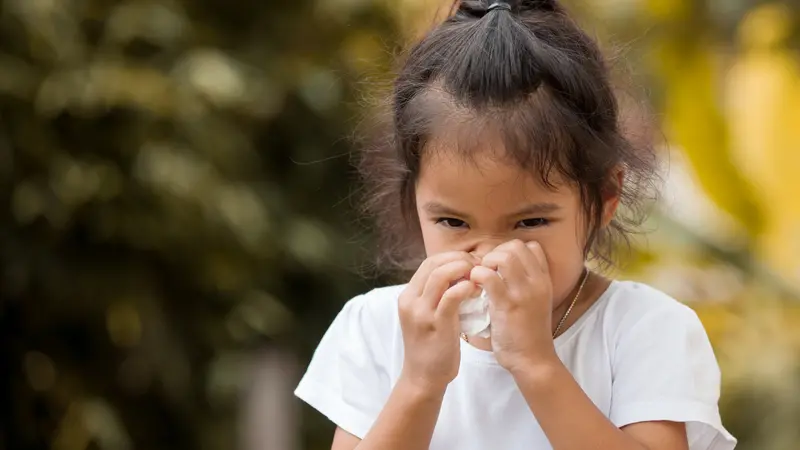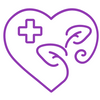

Integrative Health and Wellness

Integrative Health and Wellness
10 Holistic Allergy Remedies for Your Child
It’s that time of year for many children—allergy season. Are you hoping to significantly reduce your child’s allergy symptoms without the side effects of many of the prescription and over-the-counter medications and steroids? Here are 10 natural remedies to try.
A Clean Diet
Make sure your child is eating a diet rich in antioxidants and anti-inflammatory foods by having them “eat a rainbow” of fruits and vegetables each day. They should also eat foods rich in Omega-3s, like wild salmon and other safe seafood, and fermented foods.
During allergy season, you may want to avoid dairy products, as dairy can thicken mucus secretions and trigger histamine release, which can exacerbate allergy symptoms.
Quercetin
Quercetin is a natural antihistamine and has antioxidant and anti-inflammatory properties. Some of the top quercetin-rich foods are:
- Raw onions
- Apples (especially the skins)
- Red grapes
- Kale
- Spinach
- Capers
- Watercress
- Cherries
- Green and black tea leaves
- Bee pollen
- Chili peppers
Avoid Histamines
Some foods that can cause histamine release or are high in histamines include:
- Chocolate
- Strawberries
- Avocados
- Bananas
- Dairy
- Eggs
- Oranges
- Peaches
- Pineapples
- Raspberries
- Spinach
- Tomatoes
Artificial flavors, colors, and preservatives can also increase histamine release, so be sure to stick with whole, unprocessed foods.
Avoid Foods that Cross-React with Pollens You Are Sensitive To
Oral Allergy Syndrome, or Pollen Food Allergy Syndrome (PFAS), is caused by cross-reacting allergens found in both pollen and raw fruits, vegetables, or some tree nuts. PFAS is more common in older children, teens, and young adults who have been eating the fruits and vegetables in question for years without any problems. Those with PFAS typically are allergic to birch, ragweed, or grass pollens.
- Ragweed pollen: bananas, zucchini, cantaloupe, sunflower seeds, cucumber
- Grass pollen: melons, oranges, swiss chard, tomatoes, watermelon, wheat
- Alder pollen: almonds, apples, cherries, celery, hazelnuts, parsley, peaches, pears
- Birch: apples, plums, carrots, cherries, fennel, walnuts, pears, potatoes, peaches, wheat
Eat Local Honey
Local honey can reduce allergy symptoms, as it contains pollens from all the local plants, flowers, trees, and grasses your child is allergic to. Similar to the concept of allergy shots, small frequent doses of local honey can desensitize your child if taken before allergy season begins. Try 1-2 teaspoons daily for 2-3 months before allergy season begins for the best results.
Nasal Irrigation
To remove allergens from the nose, irrigate your child’s nose daily, or more frequently. This can be done with sinus rinses (e.g., a neti pot) or saline sprays.
Try Supplements
Some evidence-based supplements for allergy relief include:
- Quercetin: A powerful mast cell stabilizer and antihistamine.
- Vitamin C: Has been shown to reduce blood histamine by up to 50%.
- Fish oil: Can help optimize immune function and reduce the risk of children developing asthma and allergic rhinitis, and becoming sensitized to environmental allergens.
- Probiotics: Various strains of probiotics have been shown to prevent allergy flareups, reduce the severity of nose and eye allergy symptoms, reduce medication use, and improve the quality of life in patients with allergic rhinitis.
- Vitamin D3: Has many immune benefits, and has been linked with allergic rhinitis in an inverse manner.
Homeopathy
Homeopathic medicines can be a good choice for children’s allergies, as they have no side effects, no drug interactions, and they are safe for infants and pregnant/breastfeeding women. Several combination homeopathic medicines combat the most common allergy symptoms. If you have access to an integrative pediatrician, they can also help tailor homeopathic medications to your child’s individual symptoms.
Acupressure
Acupressure can help with allergy relief, and can be done at home using gentle yet firm massage on specific points to stimulate healing. “Large intestine 4” (located in the webbing between the thumb and index finger) is especially helpful for sinus headaches, congestion, runny nose, and fever.
Essential Oils
Some essential oils that may help with allergies include chamomile, eucalyptus, lemon, lavender, and peppermint. You can add a few drops of essential oil to a carrier oil (e.g., olive oil or jojoba oil) and perform the acupressure massage mentioned above. Make sure to patch test on a small area of skin before using essential oils, and keep stronger essential oils like eucalyptus and peppermint away from the eyes, nose, and mucus membranes, as they can cause skin irritation.
REFERENCES
American College of Allergy, Asthma & Immunology. (2019, March 21). Pollen food allergy syndrome. https://acaai.org/allergies/allergic-conditions/food/pollen-food-allergy-syndrome
Song, E. (2022, April). Top 10 holistic remedies for your child’s allergies. https://healthykidshappykids.com/2018/03/25/take-control-of-your-childs-allergies-naturally/


 By
By







